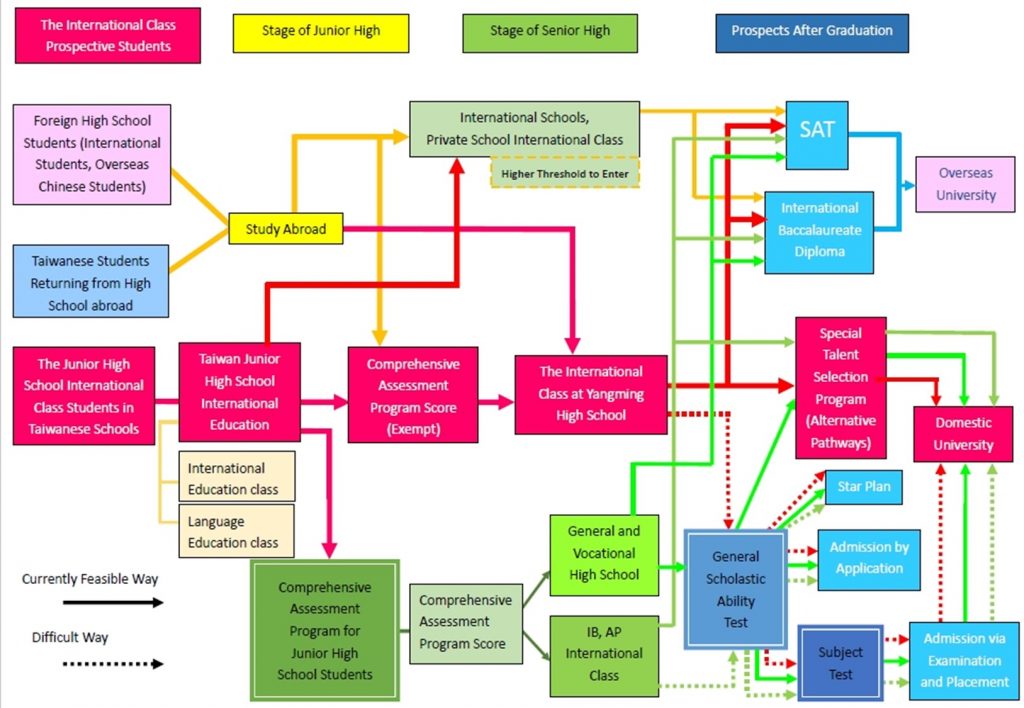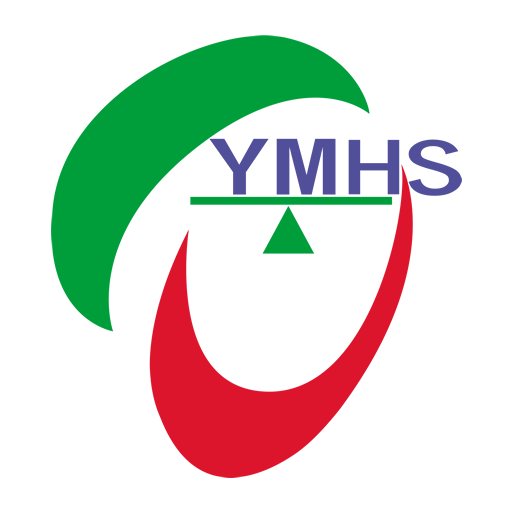University Entrance
Analysis of the Current Situation of International Class Students’ Educational Pathways in Taiwan
- According to the regulations of the Ministry of Education, the “Special Classes for the Children of International Class” mentioned the target recruitment for “International Class” based on the time of studying in Taiwan, divided into junior high school stage and high school stage:
- For international class students who come to Taiwan during junior high school, they receive Taiwan’s international class junior high school bridging education. They participate in bilingual and all-English courses with Taiwanese students through “Language Education Classes” and “International Education Classes.” After graduation, they take the junior high school education examination and are then streamed into different systems of high school education for international classes.
- For international class students who come to Taiwan during the high school stage (including international students, overseas Chinese students, and students returning to Taiwan), after studying abroad during junior high school, they directly enter qualified senior high schools for international class upon arrival in Taiwan.
- Regarding the pathways for overseas students to pursue further education in Taiwan at the high school stage, they can generally be divided into the following two categories:
- Junior high school students in Taiwan who have taken the education examination can choose to attend “Regular Senior High Schools” and “Public Schools with Established International Classes” where examination scores are considered. For students with good proficiency in Taiwanese language and subject adaptation, entering regular senior high schools allows them to study the curriculum alongside local Taiwanese students.
- There are currently two types of international curriculum models offered by public schools: (1) IB curriculum adopted by Ximending High School and Dayuan International High School; (2) Curriculums developed based on the Common Core State Standards (CCSS) set by the U.S. Federal Government and Advanced Placement (AP) courses, mainly adopted by science park experimental high schools.
Both of these curriculum models admit students through distinctive admission channels, and students need to achieve certain standards in their examination scores to apply. However, some junior high school students attending international classes in Taiwan still may not be eligible for admission based on their inadequate Chinese language proficiency. Such students, along with those who have recently arrived in Taiwan for high school, can choose to attend the “Special Classes for the Children of International Class” at the school without considering examination scores, or they can opt to pay higher tuition fees to attend “American schools” or “private schools.”
As for the educational pathways for students after graduating from high school, they can be divided into two channels: applying to overseas universities and domestic universities. Those who choose to study abroad can pursue international curricula at foreign student schools, private school international classes, IB and AP international classes during high school. Schools for international class also offer specialized courses designed for the SAT exam, enhancing students’ knowledge for applying to foreign universities. Additionally, in recent years, Taiwanese high schools have gradually introduced the International Baccalaureate and credit programs. Students can participate in various school international curriculum programs during high school to obtain an international diploma and apply to overseas universities. For those choosing domestic universities, they will take the university entrance examinations, and Taiwan’s current “Stellar Program,” “Admissions Application,” and “Subject Examinations” are considered as pathways for admission. Recognizing that some students may not be able to participate in subject examinations conducted in Chinese due to their inadequate Chinese language proficiency, the school encourages students to develop their own expertise and strengths and enter universities through “special talent selection.”
According to the analysis of the enrollment situation of the Chengzheng Junior High School International Class in Taipei City in the 111th academic year, out of 10 graduating ninth-grade international class students, 3 chose to attend “Regular Senior High Schools,” 3 chose to attend “IB and AP International Classes,” 2 chose to attend “Yangming High School International Class” in Taipei City, and 2 chose to attend “Foreign Student Schools and Private International High Schools.” This indicates the diversified educational pathways for international class students at the high school stage, which have gradually matured in recent years under policy development. However, further tracking and confirmation are needed regarding the post-high school education of international class students.
Chart: Foreign Students’ University Entrance Process in Taiwan

